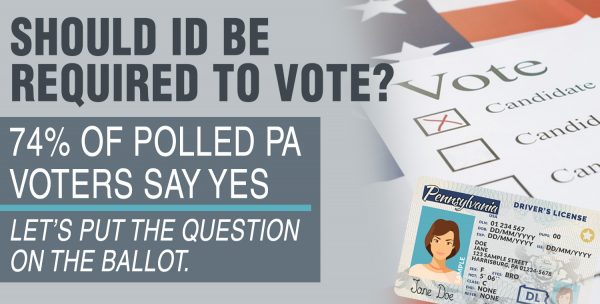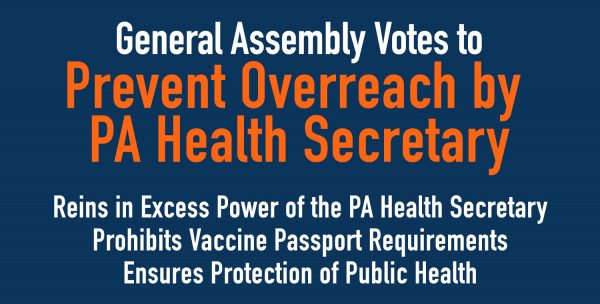
|
||
|
In this Update:
Work Continues on 2021-22 State Budget
Work continued this week on finalizing a state budget for the 2021-22 fiscal year. Earlier this year, Gov. Tom Wolf proposed a huge spending plan with a massive increase in the personal income tax. A majority of lawmakers in the Senate and House of Representatives rejected the plan. Look for a report on the new budget in next week’s e-newsletter. Martin, Aument and Hughes Resolution to Create 2030 Commission on Education and Economic Competitiveness Approved by SenateThis past week the Senate approved our 2030 Commission on Education and Economic Competitiveness Resolution. The problems associated with Pennsylvania’s aging population, our unreadiness for current and future labor needs is evident. Even before the COVID-19 pandemic began to reshape the labor market, Pennsylvania faced an uncertain economic future. This resolution creates a commission to study the education systems of neighboring states and other nations to make recommendations that ensure ours is one that meets the future economic and workforce needs of the Commonwealth. The outputs of this work would include Pennsylvania’s own “2030 Plan” that will analyze global educational and economic trends to forecast the skills and competencies Pennsylvania’s workers and citizens will need to be competitive in 2030 and beyond while setting a setting a vision for what Pennsylvania’s education system can look like in 2030 to meet those needs. Senate Passes Plan for Voter Verification Constitutional Amendment
The Senate this week approved a plan to allow voters to decide if the Pennsylvania Constitution should be amended to require identification each time a voter casts a ballot. Currently, voters are required to show identification only the first time they vote at a polling place. The proposed constitutional amendment asks voters to decide if some form of verification should be required every time a ballot is cast, including when voting by mail. A recent poll by Franklin & Marshall College found 74% of Pennsylvanians favored requirements that all voters show a photo ID and only 25% opposed. Nationally, that number climbs to 80% in support of some sort of identification to vote and drops to 18% opposed, according to a Monmouth University poll. With Gov. Tom Wolf’s refusal to consider legislation that asks voters to provide verification every time they vote, the Senate passed a bill to place the issue on the ballot as a proposed constitutional amendment so voters can decide. Unlike a piece of legislation, constitutional amendments do not need the governor’s approval. Senate Sends Bill to Rein in Health Secretary’s Power, Ban Vaccine Passports to Governor’s Desk
The Senate gave final approval of legislation that prevents the excess use of power by the state Secretary of Health and prohibits vaccine passport requirements while ensuring the protection of public health. The measure prohibits the Secretary of Health from mandating those who have not been exposed or in close contact with the exposed to wear a mask, stay at home or be socially distant. It also prevents the secretary from using the same laws to force business closures. It also prohibits the state, as well as counties, municipalities, school districts and colleges that are subsidized by state taxpayers from requiring proof of vaccination. The measure will now go to Gov. Wolf’s desk. He will have 10 days to sign the bill into law, veto it or allow the bill to become law without his signature. Bill to Expand Senior Access to Prescription Drugs Approved by Senate
Legislation to expand senior access to prescription drugs received Senate approval and was sent to the House of Representatives for consideration. The measure:
The anticipated savings from enrolling eligible PACENET individuals in Medicare Part D plans will provide enough savings to cover the cost of the income expansion. Measure Offering Optional Year of Education Due to COVID-19 Goes to the Governor
Parents would have the option to allow their children to repeat a grade level due to learning disruptions caused by COVID-19 under a bill approved by the Senate and sent to the governor. In current practice, the decision on whether to hold a student back is made solely by the child’s school and teacher. The bill would only apply to the 2021-22 school year to address learning gaps related to the pandemic. Senate Bill 664 would also give parents the option to extend enrollment in special education programs for an extra year due to COVID-19. This provision would prevent students with special needs from aging out of the system at age 21 after missing out on much of the specialized attention they need due to COVID-19 disruptions. Gov. Wolf will have 10 days to sign the bill into law, veto it or allow it to become law without his signature. Senate Votes to Permit Local Police Radar for Traffic Safety
The Senate approved and sent to the House of Representatives legislation permitting municipal police in Pennsylvania to use radar for speed limit enforcement. Speeding is the leading contributor to fatal crashes after DUI and 30% of fatal speeding crashes occur on local roads. Pennsylvania is the only state that prohibits municipal police from using radar to enforce speed limits. The new enforcement tool would come with several restrictions:
If you have a question about the information in this e-newsletter or other state related matters that you would like a response to, please click HERE to submit your inquiry through my website. This will help to ensure that we are able to respond to your question in a timely fashion due to the high volume of emails and the ever growing amount of computer generated spam mail we receive daily. |
||
|
||





Want to change how you receive these emails? 2026 © Senate of Pennsylvania | https://senatorscottmartinpa.com | Privacy Policy |






